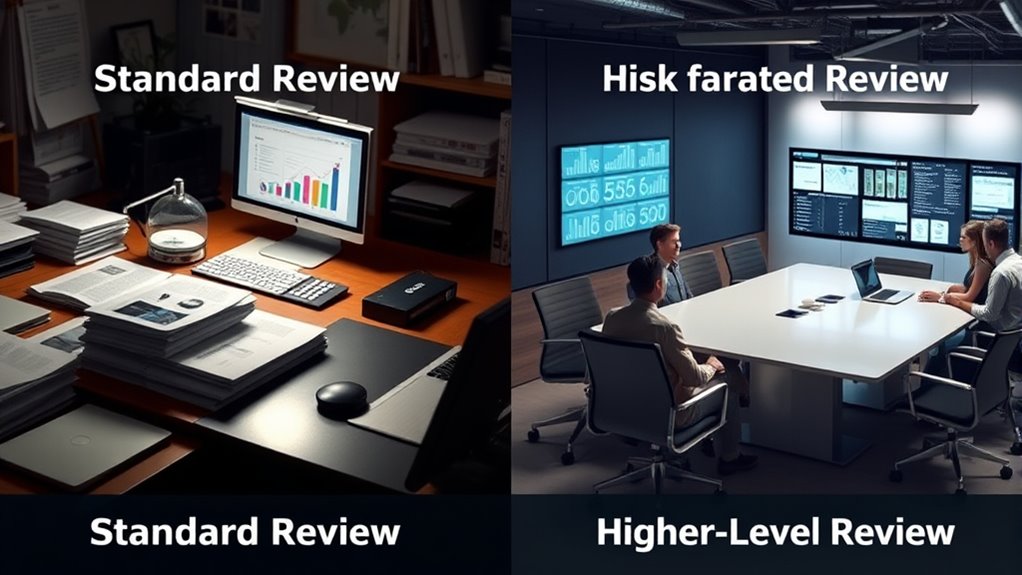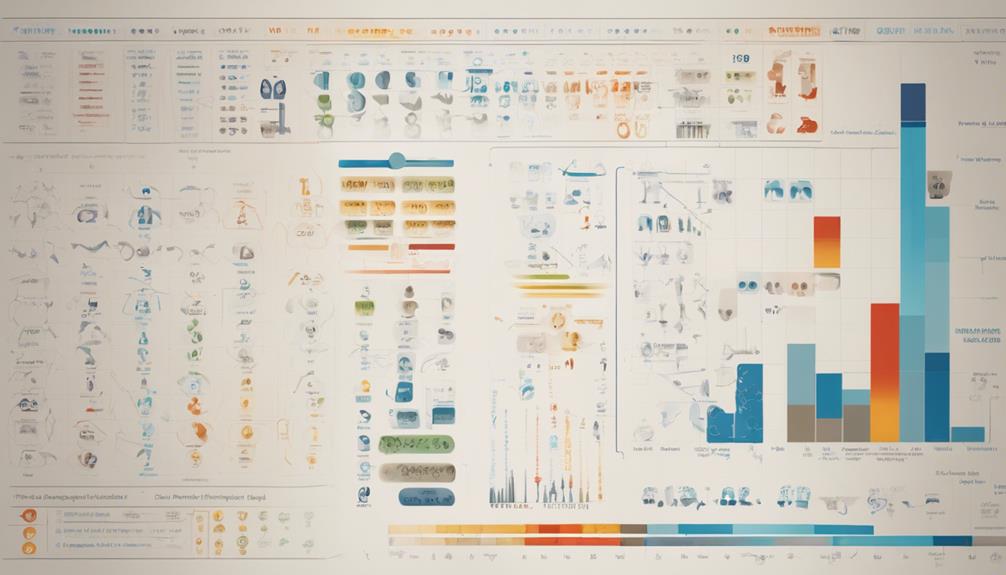Choosing between a standard and higher‑level review depends on your case’s needs. If you want a quick decision on straightforward issues without new evidence, a standard review is best. If your case involves complex problems, potential legal errors, or new evidence, a higher‑level review provides a more thorough reexamination but takes longer. Understanding these differences helps you select the right process. Continue to explore these options to make the most informed choice for your situation.
Key Takeaways
- Use a Standard Review for quick, straightforward corrections without new evidence; opt for a Higher‑Level Review when a thorough reevaluation is needed.
- Choose a Standard Review if the initial decision is clearly wrong and no additional evidence is required.
- Opt for a Higher‑Level Review when the case involves complex issues, legal interpretation, or new evidence that could change the outcome.
- Consider the time sensitivity; Standard Reviews typically take a few months, while Higher‑Level Reviews may extend longer.
- Base your choice on case complexity, urgency, and whether the goal is a factual correction or a comprehensive reassessment.
Understanding the Purpose of Each Review Type

Understanding the purpose of each review type is essential to steering the appeals process effectively. When you choose between a Standard or Higher‑Level review, you’re aligning your case with specific appeal criteria. Standard reviews focus on clarifying or correcting factual errors and usually lead to review outcomes based on the original evidence. Higher‑Level reviews, on the other hand, involve a fresh look by a different reviewer, often when you believe the initial decision was incorrect or unfair. By understanding these distinctions, you can select the review type that best matches your situation. Recognizing the appeal criteria relevant to each process helps assure your case is evaluated fairly and efficiently, increasing your chances of a favorable review outcome. Additionally, understanding projector specifications such as contrast ratio and color accuracy can also influence your decision-making in selecting the most suitable review approach for your needs.
Key Differences in Process and Timing

The process and timing for Standard and Higher‑Level reviews differ considerably, affecting how quickly you can expect a decision. Standard reviews typically follow a straightforward appeal procedure and have shorter review timelines, often completed within a few months. This process involves minimal documentation and limited opportunity for new evidence, making it faster but less exhaustive. In contrast, Higher‑Level reviews take longer because they involve a more detailed examination of your case. The appeal procedures are more all-encompassing, allowing you to submit additional evidence and arguments. Review timelines for Higher‑Level reviews can extend several months, reflecting their more rigorous process. Understanding these differences helps you decide whether a quick resolution or a more thorough review aligns better with your needs. Additionally, being aware of existential themes can foster deeper self-reflection during the decision-making process.
When to Consider a Standard Review

Opting for a Standard Review makes sense when you need a quick decision and your case doesn’t require adding new evidence. If your appeal procedure involves straightforward issues and you’re comfortable with the existing record, this route is efficient. Review timelines are typically shorter, helping you get a prompt answer. Use a Standard Review when you believe the initial decision was clearly wrong based on the evidence already in the record.
| When to Think About | Why It’s Suitable |
|---|---|
| Quick deadlines | Faster review timelines |
| No new evidence | Existing record is sufficient |
| Clear errors | Appeal procedures are straightforward |
Situations That Warrant a Higher-Level Review

When you believe that an initial decision was incorrect or unjustified, a higher-level review offers a chance for fair reconsideration. This process is especially appropriate if you missed the appeal deadline for a standard review or feel new evidence could change the outcome. Higher-level reviews are suitable when the decision involves complex issues or legal interpretation, requiring a more thorough examination. Keep in mind, the appeal deadlines remain strict—missing them can forfeit your chance for review. Additionally, verify you meet document requirements, providing all necessary information and supporting evidence. A higher-level review is best when you need a detailed reconsideration of your case, especially if initial review results were unfavorable and you believe errors were made.
Making the Best Choice for Your Case

Choosing between a standard and a higher-level review depends on your specific situation and goals. To make the best choice, start with a thorough case evaluation, considering the strengths and weaknesses of your case. Decision factors include the complexity of the issues, the evidence available, and how quickly you need a resolution. If your case involves straightforward errors or minor issues, a standard review might suffice. However, if you believe the original decision was considerably flawed, a higher-level review could be more appropriate. Weigh the potential benefits against the time and effort required for each option. Ultimately, understanding your case’s details and your desired outcome will guide you toward the most effective review process. Additionally, being aware of decision-making strategies can help you choose the best pathway.
Frequently Asked Questions
How Long Does Each Review Process Typically Take?
When asking about review duration, you’ll find that the process timeline varies. A standard review usually takes around 2 to 4 weeks, giving you a quicker response. A higher-level review, however, can take 4 to 6 months or more, as it involves a more thorough examination. The review duration depends on the complexity of your case and the workload of the reviewing authority, so plan accordingly.
Are There Specific Cases Better Suited for One Review Type?
Think of the review process like choosing a vehicle; some journeys need a nimble bike, others a sturdy truck. If you have a special case eligibility where flexibility matters, a higher-level review might be better, offering more tailored options. Conversely, for straightforward issues, a standard review can be quicker and sufficient. Select based on your situation’s complexity and whether you need a flexible review process or a streamlined approach.
What Are the Costs Associated With Standard Versus Higher-Level Reviews?
When considering review fees and legal costs, standard reviews tend to be more affordable, with lower fees and quicker proceedings. Higher-level reviews usually involve higher legal costs due to more complex procedures and longer durations. You should weigh these costs carefully, as a higher-level review might be necessary for complex cases, but if simplicity suffices, a standard review can save you money and time.
Can a Case Be Escalated From a Standard to a Higher-Level Review?
You can request a review escalation if you believe your case needs a higher-level review for better review flexibility. Typically, this involves submitting a formal request to escalate, explaining why the initial review didn’t address your concerns adequately. Keep in mind that policies vary, but generally, you have the option to move from a standard to a higher-level review to guarantee your case gets the thorough attention it deserves.
What Impact Does the Review Choice Have on Case Outcomes?
Did you know that choosing the right review type can improve case outcomes by up to 30%? When you select a review, it impacts review accuracy and reflects case complexity. A higher-level review often addresses more complex issues, potentially leading to more accurate results. Conversely, a standard review may be quicker but less detailed. Your decision influences not just the speed, but also the fairness and accuracy of the case outcome.
Conclusion
Choosing between a standard and higher-level review is like selecting the right path through a forest—each offers a different view and journey. By understanding their unique purposes, you can navigate confidently, knowing when to take a more scenic route or stick to the familiar trail. Trust your instincts and the details of your case to guide you, ensuring you find the clearing that best suits your needs. Ultimately, your careful choice leads to clearer skies ahead.











